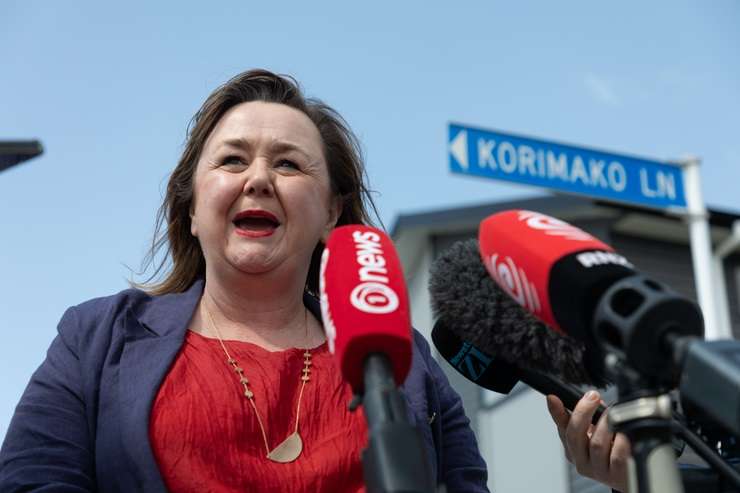It’s easy to think housing – which is widely admitted across the political divide to be in crisis – is doomed to remain a political football for decades to come.
Megan Woods, former Housing Minister under the last Labour Government, said while the portfolio was complex it did not have to be overly political.
Except, it is. Woods was a key player in an unexpected bipartisan agreement with National in 2021 on backyard density rules that allowed three-storey dwellings to be built on all residential land in the main cities.
But in May last year, before the election, National suddenly back-tracked.
Start your property search
The then National leader and now Prime Minister, Christopher Luxon, told a public meeting the party had got the density rules wrong – despite earlier supporting the rules and despite the fact his party deputy leader Nicola Willis was another key player in the bipartisan agreement along with Judith Collins.
Woods told OneRoof Willis and Collins had been the ones to approach Labour in the first place over density and she had been willing to co-operate.
When National walked away from the agreement it was an “incredibly damaging moment” in New Zealand politics, she said.
“I think we do have to be grown-ups and work together on some of the stuff that is very long term,” she told OneRoof.
Discover more:
- 'It will take more than a decade to fix NZ's housing crisis'
- Tony Alexander: No house price growth till summer
- Revealed: How to buy a house with zero cash
“This was not Labour policy, this was taking ideas from National. It wouldn’t have been the policy we would have put in place if we’d come up with it by ourselves and that was one of the strengths of it, because what people and the sector and the industry need to see and understand is enduring policy – that we’re not going to see those kind of flip-flops.”
Trust is not easily won in politics and Woods says the flip-flop exemplified how “short-termist” National MPs were on the election campaign.
“I called the bipartisanship over the median density stuff a rare grown-up moment in New Zealand politics and we need more of them but you can’t do them if you’re kind of worried that it’s just a press release and a press conference the person the other side of the table is after and will walk away from it the second it is politically expedient for them to do so.”

Woods: “I think we do have to be grown-ups and work together on some of the stuff that is very long term." Photo / George Heard
OneRoof put questions to the Housing Minister Chris Bishop about the political issues and challenges he faces in the portfolio, including whether the three-year parliamentary term impeded long-term planning and what kept him up at night regarding housing. His office referred OneRoof to a speech he gave to the Wellington Chamber of Commerce in February, in which he referred to the density issue.
This was before the Coalition's set speech on housing this week, in which Deputy Prime Minister Winston Peters outlined plans to make it easier to build “granny flats” and Bishop said house prices needed to fall.
Back in February, Bishop told the Chamber of Commerce that the Government’s position on the Medium Density Residential Standards tool was it was too blunt. “They met with considerable hostility from many councils and many communities. So, to put it bluntly, we are going to let councils have more discretion over where they have density, but they’re going to have more housing. It’s as simple as that. In some cases, that will mean more greenfields development, where the infrastructure costs can justify it. In other cases, it will mean more density. In most places, it will mean a combination of both," Bishop said.
“We are pondering right now the best way to give effect to our policy of 30 years of growth. It is important we get the policy mechanism right and I’ll have more to say soon.”
Bishop said while there was legal complexity to work through, the “direction of travel” was clear.

Former housing minister Megan Woods visits a Kāinga Ora development in September 2023. The Coalition Government has put the housing agency under review. Photo / Alex Cairns
“We want councils to continue with their plan changes to enable more housing and the optionality of the MDRS will be conditional on councils proving 30 years of development capacity as available in their area.”
Woods, who OneRoof talked to before the Coalition’s speech on Tuesday, is watching on with concern. She said the Government came into power intent on “undoing everything the previous government has done at a scale that we haven’t seen in New Zealand to a large extent before”.
She said Labour had made good progress on several fronts in housing, adding that cuts or lack of funding in one area could impact other areas. For example, she feared the National-led Coalition was pulling out of public housing.
The Government has announced a shake-up of Kāinga Ora as well as funding cuts, but Woods said without the Government building state houses, the construction sector would take a hit and that would impact the commercial sector and contribute to the drain of skilled labour from New Zealand.
“It’s kind of chaos theory when it comes to the housing market in a way. You know, a butterfly flaps in the social housing sector and you’re going to feel that in commercial residential construction as well,” she said.
“What we have with the state house build, not only do we get badly needed state houses but that certainty of order book for construction companies cannot be under-estimated.
“What’s going to happen, we’ll have another uptick in our economy, the construction will start booming again and we won’t have the skilled labour.”

Woods in 2021, with then National leader Judith Collins, centre, and then housing spokeswoman Nicola Willis. The three announced changes to density rules. Luxon later pulled National's support for the agreement. Photo / Mark Mitchell
Both parties are concerned about infrastructure but have different views on how to fix what is an immense problem holding back building.
Woods said the much-criticised KiwiBuild policy – which National has signalled will end – was the right idea at the wrong time, with the scheme smacking into the same “brick wall” everyone else has been smacking into for decades, and that’s the lack of build-ready land.
“This notion that we just zone land and magically housing will appear isn’t the case,” she said.
The Government was talking about sharing GST from new builds with councils, but she said that’s a blunt and unsophisticated tool for financing infrastructure and a nuanced and detailed look was needed because sometimes new roads could use existing infrastructure whereas other areas have a case for government spending to ensure building takes place.
She is also concerned about other aspects of discarded Labour policy – such as the reversal of Labour’s removal of interest deductibility for landlords on existing homes, saying the policy was driving much-needed new builds.
Labour was not against “mum and dad” landlords but wanted them to be part of the housing solution by adding to supply, not competing with their own children in the suburbs for pre-existing homes.

The current housing minister has stated that house prices need to fall to improve affordability. Photo / Fiona Goodall
“If you’re competing with your parents who are looking for their rentals in that same pool, all that’s going to do is push prices up,” she said.
“That’s one of my fears about bringing back interest deductibility – as well as all the ways we could have spent $2.9 billion – is actually what it does in that supply-side equation for the housing market.”
Woods also cannot understand why National scrapped first home grants, another “absolutely critical” tool for first-home buyers.
One of the changes Labour made to the grants was enabling them to be given to more than just couples, which she said meant many people who had not been able to buy could pool their grants and loans with other family members.
“We made those changes so we were looking beyond just the immediate nuclear family and the way in which we might be able to support those families who never have had a chance at home ownership unless they pulled together and grouped together to do it.”
She said Labour’s work on progressive home ownership had also been starting to get traction, and that was “a game changer” in terms of who was able to get on to the housing ladder with around 1500 families helped.
All the policies were interconnected, she said: “That’s what concerns me, is that the Government’s going through and doing kind of populist culling of programmes and I don’t think they’ve got their head around how interconnected all these things are yet.”
But National’s policy also focuses on fixing the housing crisis across a range of policy points.
Bishop told the Wellington Chamber of Commerce various governments had put housing in the too-hard basket for too long and spoke of a moral case for housing reform, which included the morality of allowing thousands of people to live in motels, “bouncing from grotty unit to unit, often surrounded by squalor, crime and poverty.”
“Our collective failure to build enough houses has trapped people in poverty, it has increased inequality, it has made us poorer rather than wealthier, and it has shattered the Kiwi dream of a property-owning democracy.”
He continued that theme on Tuesday. Bishop told reporters at the post-Cabinet press conference that the Government wanted to make housing “more affordable for New Zealanders” and had answered “yes” when asked if prices needed to fall, the New Zealand Herald reported.
“Average house prices to the average household income are too high by any objective measure. They are severely unaffordable by international standards,” he said.
“The flipside of house prices falling for people who own homes is that they become more affordable for people who don’t own homes. There is a whole generation of young New Zealanders who have been locked out of the housing market because average house prices are too high.
“If we’re going to be a property-owning democracy, which [we] used to be, we need to make housing more affordable."
- Click here to find properties for sale














































































